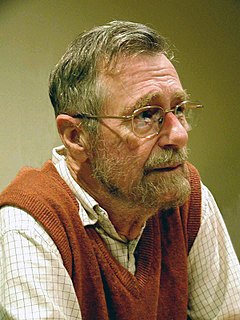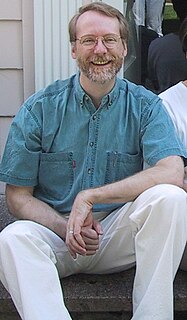 W
WEdsger Wybe Dijkstra was a Dutch computer scientist, programmer, software engineer, systems scientist, science essayist, and pioneer in computing science. A theoretical physicist by training, he worked as a programmer at the Mathematisch Centrum (Amsterdam) from 1952 to 1962. A university professor for much of his life, Dijkstra held the Schlumberger Centennial Chair in Computer Sciences at the University of Texas at Austin from 1984 until his retirement in 1999. He was a professor of mathematics at the Eindhoven University of Technology (1962–1984) and a research fellow at the Burroughs Corporation (1973–1984). In 1972, he became the first non-American, non-British, and continental European winner of the Turing Award.
 W
WCynthia Dwork is an American computer scientist at Harvard University, where she is Gordon McKay Professor of Computer Science, Radcliffe Alumnae Professor at the Radcliffe Institute for Advanced Study, and Affiliated Professor, Harvard Law School and Harvard's Department of Statistics. She is a distinguished scientist at Microsoft Research.
 W
WRobert Gray Gallager is an American electrical engineer known for his work on information theory and communications networks. He was elected an IEEE Fellow in 1968, a member of the National Academy of Engineering (NAE) in 1979, a member of the National Academy of Sciences (NAS) in 1992, a Fellow of the American Academy of Arts and Sciences (AAAS) in 1999. He received the Claude E. Shannon Award from the IEEE Information Theory Society in 1983. He also received the IEEE Centennial Medal in 1984, the IEEE Medal of Honor in 1990 "For fundamental contributions to communications coding techniques", the Marconi Prize in 2003, and a Dijkstra Prize in 2004, among other honors. For most of his career he was a professor of electrical engineering and computer science at the Massachusetts Institute of Technology.
 W
WJoseph Yehuda Halpern is an Israeli-American professor of computer science at Cornell University. Most of his research is on reasoning about knowledge and uncertainty.
 W
WLeslie B. Lamport is an American computer scientist. Lamport is best known for his seminal work in distributed systems, and as the initial developer of the document preparation system LaTeX and the author of its first manual. Leslie Lamport was the winner of the 2013 Turing Award for imposing clear, well-defined coherence on the seemingly chaotic behavior of distributed computing systems, in which several autonomous computers communicate with each other by passing messages. He devised important algorithms and developed formal modeling and verification protocols that improve the quality of real distributed systems. These contributions have resulted in improved correctness, performance, and reliability of computer systems.
 W
WMichael Oser Rabin is an Israeli mathematician and computer scientist and a recipient of the Turing Award.
 W
WMichael Lee Scott is a professor of computer science at the University of Rochester in Rochester, New York.
 W
WNir Shavit is an Israeli computer scientist. He is a Professor in the Computer Science Department at Tel Aviv University and a Professor of Electrical Engineering and Computer Science at the Massachusetts Institute of Technology.
 W
WRobert Eliot Shostak is an American computer scientist and Silicon Valley entrepreneur. He is most noted academically for his seminal work in the branch of distributed computing known as Byzantine Fault Tolerance. He is also known for co-authoring the Paradox Database, and most recently, the founding of Vocera Communications, a company that makes wearable, Star Trek-like communication badges.